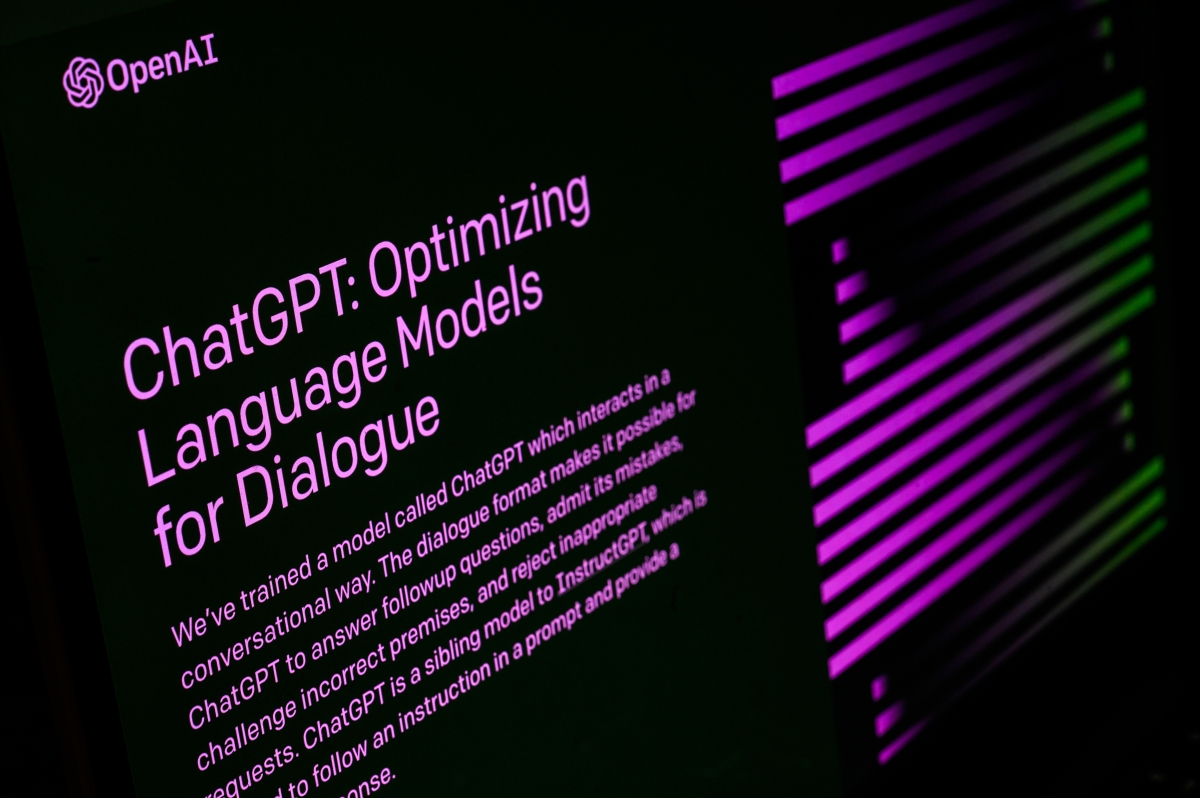OpenAI's ChatGPT Under FTC Scrutiny: A Deep Dive Into The Investigation

Table of Contents
The Allegations Against OpenAI and ChatGPT
The FTC's investigation into OpenAI centers around several key allegations concerning ChatGPT's practices. These allegations raise serious questions about data privacy, the spread of misinformation, and potentially deceptive trade practices.
Data Privacy Concerns
ChatGPT's ability to engage in human-like conversations relies on vast amounts of data collected from users and across the internet. The FTC's investigation is scrutinizing whether OpenAI's data collection, use, and protection practices comply with existing regulations. Specific concerns include:
- Unauthorized data collection: Allegations suggest ChatGPT may be collecting and storing user data without explicit consent, potentially violating laws such as COPPA (Children's Online Privacy Protection Act) and GDPR (General Data Protection Regulation).
- Insufficient data security: Concerns exist regarding the security measures implemented to protect the vast amounts of user data processed by ChatGPT. Breaches could expose sensitive personal information, including health records, financial details, and private communications.
- Lack of transparency: Critics argue that OpenAI hasn't been sufficiently transparent about its data practices, making it difficult for users to understand how their data is being collected, used, and protected. This lack of transparency hinders informed consent.
These data privacy issues are critical because ChatGPT handles potentially sensitive information. The risks associated with improper handling of such data include identity theft, financial fraud, and reputational damage. Further investigation is crucial to ensure compliance with existing data protection regulations and prevent future misuse.
Misinformation and Bias
Another central concern in the FTC investigation is the potential for ChatGPT to generate inaccurate, misleading, or biased information. As a large language model, ChatGPT learns from the data it is trained on, which can reflect existing societal biases. This can lead to several problems:
- Spread of false narratives: ChatGPT's ability to generate realistic-sounding text can be exploited to spread misinformation and propaganda, potentially influencing public opinion and even causing real-world harm.
- Reinforcement of harmful stereotypes: The model’s output may inadvertently perpetuate harmful stereotypes and biases, potentially contributing to discrimination and prejudice.
- Difficulty in fact-checking: The sophisticated nature of ChatGPT's responses can make it challenging to identify inaccuracies and biases, further amplifying their impact.
Mitigating bias in large language models is a significant challenge. The FTC investigation will likely explore OpenAI's efforts (or lack thereof) to address these issues and ensure the responsible deployment of its technology.
Deceptive Trade Practices
The FTC investigation also examines potential deceptive marketing practices related to ChatGPT's capabilities and limitations. Concerns include:
- Exaggerated claims: Marketing materials may overstate ChatGPT's capabilities, leading users to believe it can perform tasks it is not equipped to handle.
- Misleading representations: The presentation of ChatGPT might downplay its limitations, creating unrealistic expectations regarding its accuracy, reliability, and ethical considerations.
- Lack of transparency about limitations: Users may not be adequately informed about the potential for errors, biases, and limitations inherent in large language models.
These deceptive trade practices can mislead consumers and damage their trust in AI technology. The FTC's investigation will likely determine whether OpenAI engaged in any actions that violated consumer protection laws.
The FTC's Investigative Process
The FTC's investigation into OpenAI follows a thorough process designed to uncover the facts and determine whether violations have occurred.
The Scope of the Investigation
The investigation likely encompasses a wide range of areas, including:
- Review of OpenAI's data collection and usage policies.
- Analysis of ChatGPT's output for bias and inaccuracies.
- Examination of OpenAI's marketing and advertising materials.
- Interviews with OpenAI employees and users.
- Assessment of OpenAI's compliance with relevant laws and regulations.
The FTC’s approach will involve collecting evidence and interviewing witnesses to build a comprehensive understanding of OpenAI’s practices and their potential impact on consumers.
Potential Outcomes
Depending on the findings, the FTC investigation could result in several potential outcomes for OpenAI:
- Consent decrees: OpenAI might agree to changes in its practices to address the FTC's concerns.
- Fines: Significant financial penalties could be imposed for violations of consumer protection laws.
- Cease and desist orders: OpenAI might be prohibited from certain practices.
- Legal action: In more severe cases, the FTC could pursue legal action against OpenAI.
These outcomes could significantly impact OpenAI's business and the future of AI development, potentially influencing the trajectory of the entire AI industry.
The Broader Implications for the AI Industry
The FTC's investigation into OpenAI and ChatGPT has significant ramifications for the broader AI industry, highlighting crucial ethical and regulatory considerations.
Ethical Considerations in AI Development
This investigation underscores the need for responsible AI development and deployment. Key ethical considerations include:
- Prioritizing data privacy and security.
- Mitigating bias and ensuring fairness in AI systems.
- Promoting transparency and accountability in AI development.
- Considering the potential societal impact of AI technologies.
The AI industry must actively address these ethical concerns to maintain public trust and prevent harm.
The Future of AI Regulation
The FTC's investigation will likely shape the future of AI regulation. Potential changes include:
- Strengthened data privacy laws specifically addressing AI.
- Increased scrutiny of AI algorithms and their potential biases.
- New regulations governing the marketing and advertising of AI products.
- Development of industry standards for ethical AI development.
This investigation sets a precedent for how regulators will approach the oversight of AI technologies, influencing the development and deployment of AI globally.
Conclusion: Navigating the Future of ChatGPT and AI Regulation
The FTC's investigation into OpenAI and ChatGPT highlights the critical need for responsible innovation in the AI field. The allegations of data privacy violations, misinformation, and deceptive trade practices underscore the urgency of establishing robust ethical guidelines and regulations. The potential outcomes of this investigation will significantly influence the future of AI development and the broader landscape of AI regulation. Stay updated on the OpenAI ChatGPT FTC investigation and follow the latest developments in AI ethics to understand the evolving landscape of responsible AI. Continued vigilance and a commitment to ethical practices are essential to ensure that AI benefits society while mitigating potential risks.

Featured Posts
-
 How Middle Management Drives Organizational Success And Employee Development
Apr 26, 2025
How Middle Management Drives Organizational Success And Employee Development
Apr 26, 2025 -
 Beyond The Mouse 7 Fresh Dining Experiences In Orlando 2025
Apr 26, 2025
Beyond The Mouse 7 Fresh Dining Experiences In Orlando 2025
Apr 26, 2025 -
 Ahmed Hassanein Poised To Make Nfl Draft History
Apr 26, 2025
Ahmed Hassanein Poised To Make Nfl Draft History
Apr 26, 2025 -
 The Zuckerberg Trump Era Implications For Technology And Society
Apr 26, 2025
The Zuckerberg Trump Era Implications For Technology And Society
Apr 26, 2025 -
 7 New Orlando Restaurants To Explore Beyond Disney World In 2025
Apr 26, 2025
7 New Orlando Restaurants To Explore Beyond Disney World In 2025
Apr 26, 2025
